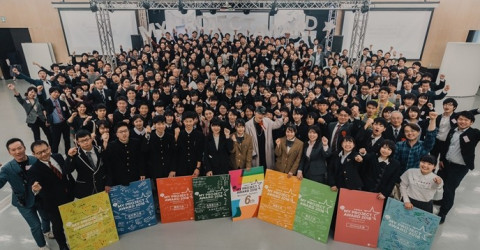
GCED Basic Search Form
Quick Search
Вы здесь
Новости

A project set up in the wake of the devastating earthquake and tsunami in 2011, which destroyed large parts of the Tohoku region of northern Japan, aims to sustainably rebuild one town both mentally and physically.
'My Project' is a learning programme for high school students set up in the town of Otsuchi by Katariba, a non-profit organization which has been running educational activities related to the environment since 2001. It was nominated for the 2018 UNESCO-Japan Prize on Education for Sustainable Development (ESD). UNESCO's ESD programme supports countries to develop and expand educational activities on sustainability issues including disaster risk reduction.
On 11 March 2011 the 6.6 magnitude earthquake, the most powerful ever recorded in Japan, claimed around 20,000 lives. In Otsuchi, at 220 km from the epicentre in Fukushima, the disaster claimed 1,600 of the 15,000 then population and destroyed much of the town with 60 per cent of residents losing their home. In the same year Katariba began to build a collaborative after-school centre which is open to every student in the town. They can visit and study at any time as well as meeting volunteers and staff of Katariba to talk about themselves and their lives in the wake of the disaster.
'About a year after the disaster we heard from students at the school that they had been supported by others so far but now wanted to save their town by themselves,' says Project team member Manami Yoshida.
Building resilience in people and infrastructure
'My Project' was born taking as its starting point building resilience into people and infrastructures based on two principles, 'action' and 'ownership'. It works by encouraging students to identify an issue in their community or a field of interest and design and run a project to solve or further those ideas.
'The future of the environment is uncertain and unpredictable. To build a sustainable society, we need to foster youth who have the power and creativity to face whatever ecological, social or economic issue is in front of them,' said Manami. 'We are looking for students to gain a mindset where they are driven to learn and where they say, "If I change, if I take action, then I can create change in society as well."'
One idea to run a study tour to raise awareness about the disaster brought about sustainable lasting change as it became an official government strategy. The student behind the tour now wants to study community revitalization at college. Other ideas have included a greening scheme for land suffering salt damage due to the tsunami and the creation of a system where the general public can use defibrillators in an emergency without special knowledge.
'My Project' has now expanded across Japan and involves not only students but also governments, non-profit organizations and community members. In 2013 an award scheme was established to honour projects starting with just 18 students. This year 3,000 high school students took part. Start Up camps are also held each year where projects are planned and analysed.
'Our goal is to create an ecosystem where everyone can do their own 'My Project'. We aim to invite over 100,000 high school students to the 2020 awards and to collaborate further with more teachers,' said Manami. 'The transformation which students undergo acts as a ripple effect, causing change in their own communities and outside. New skills are learned and mindsets are changed.'
Creating a supportive network
In Saga, a city on the island of Kyushu which faces issues such as a decline in population and job opportunities, students launched the Sagan Ruby Project to make saleable products like soda and eco-friendly lip balm produced with Sagan Ruby, which is a local grapefruit. The products became popular, stimulating the local community and farming economy as students worked together with local businesses and colleges.
'My Project' also spreads its ideas by creating a supportive networking group for adults.
'By inviting schools and the local community to attend our networking group we hope to make new partnerships. Our aim is to create a network of supporters across Japan,' said Manami. Online support and video materials are provided for those living in remote rural areas.
'My Project' also partners with students globally and has organized exchange programmes for example with the US-based Global Kids which empowers children to take action on critical world issues.
URL:
